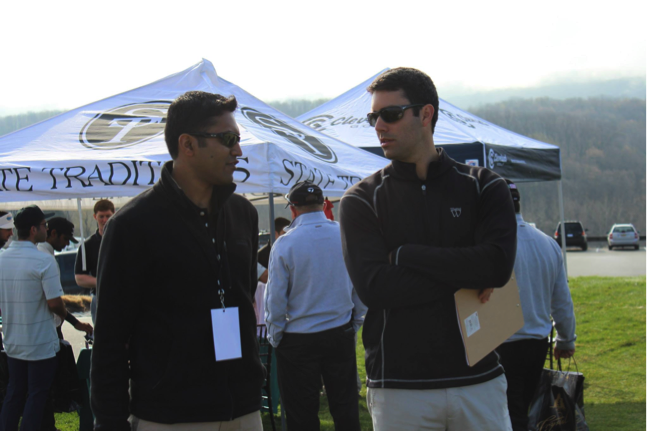Pace of Play is a serious problem in college golf. Unlike other golf “issues” such as how big the cup should be or what tees golfers of different calibers play from, everyone agrees when it comes to Pace of Play; we need faster rounds of golf.
The NCCGA has traditionally followed the common USGA Pace of Play rules, emphasizing the penalization of players who fall behind pace. Although these rules in theory address all of the right aspects of pace including the time it takes to complete each hole and the gap between the group ahead, the NCCGA has lacked the staff to monitor pace of play and execute the policies. Beginning in the fall 2014 season that is going to change.
At all NCCGA Regional Tournaments, at least 2 volunteers, in certain cases experts from state golf associations, will now enforce our updated NCCGA Pace of Play policy. Each volunteer will handle nine holes of the course and hand out yellow cards (1 stroke penalty) to those who fall behind and then red cards (two stroke penalty) when the gaps aren’t closed. So long as the gaps are closed or the group finishes their round in less than five hours and fifteen minutes, no penalties will be assessed.
Whether you are a weekend golfer, avid tournament player, or somewhere in-between, the time it takes to play a round of golf impacts your golfing experience. Competitive golf organizations have approached Pace of Play in many ways, the most successful of which is the AJGA. With ample volunteers and rules and strict guidelines to keep play below 4.5 hours, the AJGA has made great strides in laying a foundation for what tournament Pace of Play should look like.
Unfortunately, not all tournament play is run as efficiently as the AJGA's. Even on the NCAA division 1 collegiate level, Pace of Play is often times an issue. Sean Keating, former University of Dayton player and assistant coach, explained that “it isn’t unusual to spend over 5 and sometimes 6 hours on the course per round. For the 36 hole tournament days, teams consistently arrive before sunrise and leave after sunset.”
Beyond the introduction of required NCCGA Staff members at each of the 55 tournaments this fall, the NCCGA is shifting its focus to emphasize faster play across the board, not just the penalization of slow play for the one or two groups. By taking some key learnings from the AJGA policies, we are strongly encouraging players to take accountability for their groups pace by ensuring provisional balls are hit when there is doubt it will be found, having players walk to the next tee prior to all players holing out, and playing ready golf.
Want to volunteer at an NCCGA Tournament?
Pace of Play is an epidemic in competitive college golf and one or two slow groups can affect the pace of an entire tournament. By enforcing our yellow and red card system with adequate volunteer support, we will speed up pace for everyone and NCCGA participants will play #ReadyGolf this fall.
**Matt Weinberger is the Chairman of the NCCGA, contact Matt on Twitter @bergsUD






